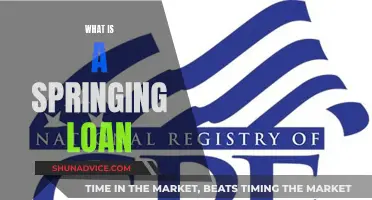
Merchant Cash Advances (MCAs) are a form of revenue-based financing where a business is advanced cash by an MCA provider in exchange for a percentage of their future revenue. MCAs are distinct from traditional loans in that they are structured as purchases of future revenue rather than creating a legal obligation to repay a fixed amount with interest. This means that they are not subject to the same regulations as traditional loans and are not governed by state usury laws. While MCAs are legal, the lack of regulation in the industry has led to concerns about predatory lending practices and high-interest rates. As a result, several states have begun to implement regulations to address these issues and protect borrowers.
| Characteristics | Values |
|---|---|
| Legality | Merchant Cash Advances (MCAs) are legal but some practices may be deemed unfair or unlawful. |
| Regulation | MCAs are not subject to federal regulation or state laws that apply to traditional loans. However, some states are starting to enforce MCA-specific regulations. |
| Usury Laws | MCAs are not subject to usury caps under state law. |
| Licensing | MCA providers are generally not subject to the same state-level licensing requirements as lenders. |
| Contract Terms | MCA contracts are extremely one-sided and may include unfair provisions. |
| Reconciliation | MCAs offer a flexible repayment model based on a percentage of the business's future revenue, with no fixed payment amount or schedule. |
| Risk | The risk of the merchant's insolvency or revenue decline is typically borne by the MCA provider. |
| Scams | The lack of regulation and entry barriers has attracted bad actors, leading to various scams and predatory lending practices. |
What You'll Learn

MCA legality varies by state
Merchant Cash Advances (MCAs) are not considered loans, and there is very little regulation associated with them. MCA companies do not need to follow state usury laws, which limit how much interest companies can charge on loans or credit cards. There are no laws that limit how much an MCA company can charge in its "purchase of future receivables."
Similarly, in New Jersey, the Attorney General brought a case against Yellowstone in 2020, alleging unfair and deceptive conduct. In Florida, the 3rd DCA ruled that an MCA purchase and sale agreement was not a loan, highlighting the distinction between a loan and the purchase and sale of receivables.
Some states, like New York, have outlawed the practice of lenders using "Confessions of Judgment" (COJ) to secure court judgments against out-of-state delinquent borrowers. However, New York still permits the use of Confessions of Judgment if the business is domiciled within the state.
The Uniform Commercial Code (UCC) is another example of regulation that applies to default issues with MCAs. While the UCC is not federal law, it is adopted across the country and provides a uniform way to regulate business transactions in multiple states. However, there are often local or state workarounds, and it does not regulate the costs and fees charged by lenders who purchase receivables.
As MCA legality varies by state, it is crucial to consult qualified legal counsel or a knowledgeable financial advisor before considering an MCA.
Understanding Caveat Loans: Risky Business?
You may want to see also

MCA lenders' predatory practices
While merchant cash advances (MCAs) are legal, they are not subject to the same regulations as traditional loans, and some MCA lenders have been accused of predatory practices. The lack of regulation in the MCA industry has made it a favourite instrument of predatory lenders.
MCA providers give business owners an advance against their future revenue. They are structured as a sale of future revenues, with the provider advancing cash to the merchant in exchange for a fixed amount of the merchant's future receipts. This means that, unlike a loan, there is no unconditional obligation for the merchant to "repay" the MCA provider. Instead, the merchant sells a portion of its future receipts. However, this structure can be manipulated by predatory lenders to trap unsuspecting businesses.
Some predatory lenders target companies that are in a pinch, keeping barriers to entry very low. They market straight to brokers, whose job it is to bring them businesses to prey on. These brokers present themselves as "investors" and co-opt the word "investment" to put businesses at ease. They may also use the term "line of credit", which has a better reputation than a loan, to disguise what they are offering.
Predatory MCA lenders may also be carelessly giving businesses more money than they can possibly pay back. They do not take assets as collateral, but this does not mean a business's assets are protected. Contracts are often extremely one-sided, giving the lender the freedom to pursue the business owner, as well as contact their customers and family members if they default.
In addition, some MCA lenders have been accused of a lack of transparency in their terms and pricing. For example, in 2024, the New York Attorney General sued Yellowstone Capital LLC, accusing them of running a predatory lending operation by disguising loans as purchases of merchants' future revenues. Yellowstone made it difficult for merchants whose revenue declined during the term of the MCA to reduce their payment obligations and engaged in highly aggressive enforcement tactics, including pursuing business owners personally even after their business ceased operations. Similar allegations were made by the New Jersey AG in 2020.
Title Loans: Are They Legal in New York State?
You may want to see also

MCA regulation and legal protection
Merchant Cash Advances (MCAs) are legal, but they are distinct from traditional bank loans, and there is little regulation. MCA providers advance cash to businesses against their future revenue. This means that, if properly structured, MCAs are not considered loans and are not subject to the same regulations as loans.
MCA regulation has traditionally been handled at the state level, but the varying standards across states could lead to more comprehensive federal involvement. Several states have implemented regulations that specifically address MCAs and other high-risk lending products. These regulations are often targeted towards lender transparency, disclosure, and preventing abusive lending or collection practices. For example, New York has implemented laws requiring greater transparency in MCA contracts, and outlawing the use of "Confessions of Judgment" (COJ) to secure court judgments against out-of-state delinquent borrowers.
The lack of standardised agreements and regulation in the MCA industry means that MCA agreements are often filled with complex terms and legal jargon, and each provider offers customised and very different contracts. This makes it critical for businesses to comprehensively understand the terms of any potential MCA funding, including all associated costs and fees, and to calculate the "Effective Interest Rate" of the advance.
To avoid detrimental effects, businesses should be cautious and carefully examine MCA agreements for unfavorable clauses, terms, or additional guarantees. It is recommended that they seek legal advice to confirm that the agreement is fair and to understand the legal implications of the agreement.
The US Department: Loan Write-Offs and Time Limits
You may want to see also

MCA contracts and their risks
MCA contracts, or Merchant Cash Advance contracts, are agreements between a business and an MCA provider that outline the terms of a cash advance. While MCA contracts are legal, they are often complex and filled with legal jargon, and the lack of standardised agreements means that each provider offers customised and very different contracts. This makes it difficult for merchants to understand the terms and associated risks.
MCA contracts are often less flexible than traditional loans and can pose risks due to their high fees and daily repayment structure. The repayment structure of MCA contracts involves a percentage of daily sales until the advance is repaid, which can often lead to higher costs than a traditional loan. This is because, unlike loans, MCA products are not subject to usury caps under state law, and providers are generally exempt from the licensing and supervisory requirements that apply to lenders.
The complex nature of MCA contracts, coupled with the lack of regulation in the industry, means that merchants can easily be caught out by unfair or unlawful practices. For example, some contracts may have hidden clauses that trigger additional fees, such as termination fees for early repayment or late payment fees caused by technical glitches. Merchants may also be required to provide passwords to their bank accounts or face aggressive enforcement tactics, such as pursuing business owners personally, even after their business has ceased operations.
Furthermore, defaulting on an MCA contract can lead to severe consequences, including legal action and additional fees. If a dispute arises, the MCA provider can obtain a judgment against the merchant without notifying them or allowing them to present their case. Therefore, it is crucial for merchants to carefully evaluate the terms and understand the total cost before entering into an MCA agreement.
Harmony Loans: Understanding the Basics of This Financial Option
You may want to see also

MCA vs traditional loans
Merchant Cash Advances (MCAs) and traditional loans are two popular choices for business funding. However, they differ in several key ways.
Firstly, MCAs are not considered loans because they involve selling a percentage of future revenue rather than borrowing money. This means that MCAs are not subject to the same scrutiny and regulations as traditional loans. As a result, MCAs have fewer requirements for approval, do not require collateral, and are typically faster to obtain.
Traditional loans, on the other hand, are highly regulated and offer more predictable repayment terms. They usually involve borrowing a fixed amount with predetermined monthly instalments and interest rates. Obtaining a traditional loan can be more challenging, especially for businesses with poor credit, as they often require a lengthy track record of profitability and extensive documentation.
Another difference is in the repayment structure. MCAs are typically repaid through a percentage of daily credit card sales, which can be beneficial during slow periods as the repayment amount decreases. In contrast, traditional loans have fixed repayment amounts, which can make it easier to plan and maintain cash flow.
While MCAs offer quick access to capital and more flexible eligibility criteria, they often come with higher costs due to factor fees and hidden fees. Traditional loans, on the other hand, tend to have lower interest rates and more transparent costs.
In summary, MCAs may be suitable for businesses that need rapid financing and have challenges qualifying for traditional loans. However, traditional loans offer more predictable and potentially lower costs, making them a better option for businesses that can meet the eligibility requirements.
China's Debt: America's Multi-Million Dollar Question
You may want to see also
Frequently asked questions
Merchant Cash Advances (MCAs) are not considered loans, so there are few regulations for them. While MCAs are legal in some states, they are deemed unfair or unlawful in others. The legality of MCAs can be impacted by various factors and differs from state to state.
MCA contracts are extremely one-sided, giving the lender the freedom to pursue you, your business, customers, and family members if you default. There is also no governing body or application process to regulate funders, which has resulted in predatory lending practices and high-interest rates.
MCA funders have been known to double-debit a business's accounts, charge more than permitted by contract, illegally freeze bank accounts, and send UCC liens to the business's clients.







